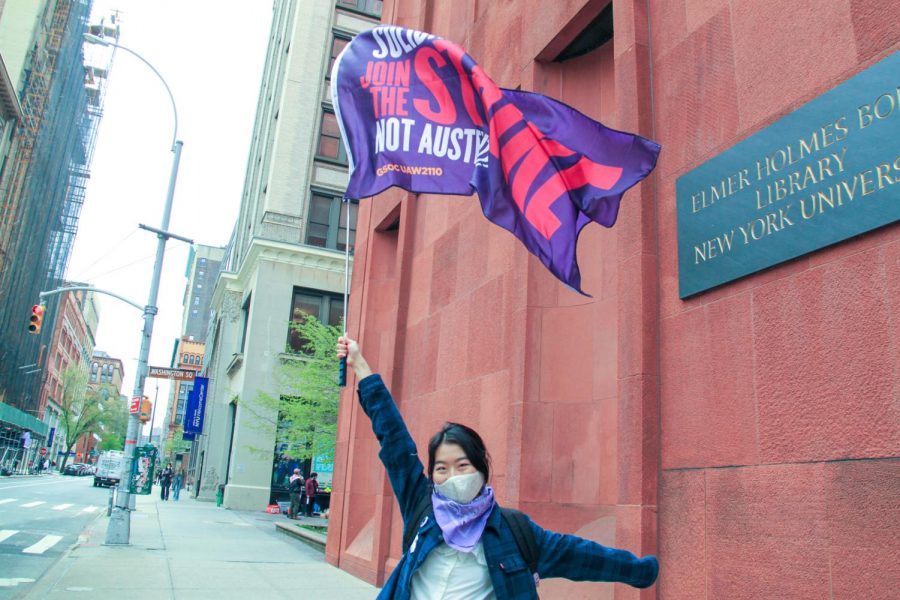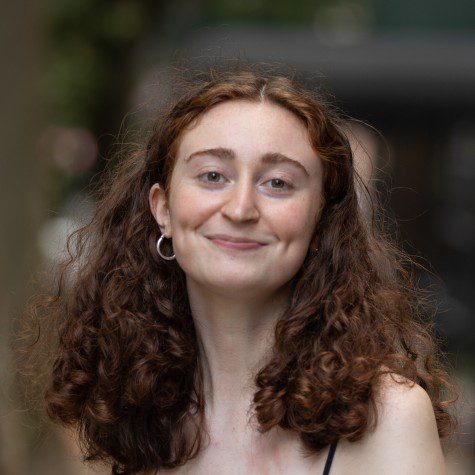GSOC agrees to mediator, NYU clarifies purpose of email to parents
NYU’s graduate student workers are striking for the fourth day in demand of a new contract.
NYU GSOC member Yuwei waves a flag that reads “Solidarity, not austerity, join the strike” on day 2 of the strike. GSOC will be picketing all week. (Staff Photo by Alexandra Chan)
April 29, 2021
The Graduate Student Organizing Committee’s strike entered its third day on Wednesday, April 28. Students and faculty reported disruptions to class activities, such as delayed assignment deadlines and cancelled recitation sections. GSOC continued its picketing activities in person and online, with more than 100 members of the union assembling outside Bobst Library every day since Monday.
The strike has begun to gain traction among local and national politicians as New York City mayoral candidate Dianne Morales and Sen. Bernie Sanders voiced their solidarity with GSOC. Over the past three days, the union has agreed to the university’s request for a neutral, third-party mediator; an email sent by the university to parents has garnered widespread criticism; and various academic departments and student organizations have declared their support for GSOC.
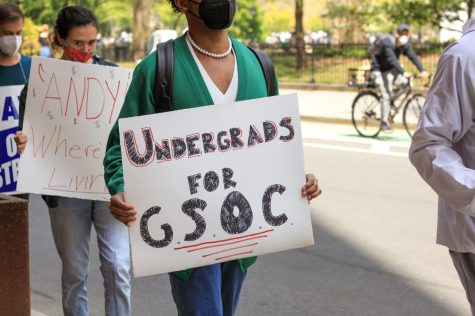
GSOC responds to NYU’s proposal for the introduction of a mediator
After a bargaining session on the evening of April 26, NYU and GSOC entered into a tentative agreement to introduce a neutral, third-party mediator into bargaining sessions.
GSOC agreed to the mediator on three conditions — that the bargaining sessions continue to be open to all members, the ongoing strike not be put on pause and that the mediator be the federal caseworker assigned to the union. NYU accepted the first two, but needed 48 hours to respond to the last condition regarding the federal caseworker.
The union was initially opposed to the introduction of a mediator because mediated bargaining sessions are typically required to be closed. This means that union members not on the bargaining committee would not be able to attend. The union argued a mediator would legitimate NYU’s position and did not see any strategic gain to mediation while NYU allegedly stonewalled negotiations. But the union now believes a mediator may be beneficial, according to a GSOC press release.
“Monday’s session showed mediation will be beneficial to help clarify the positions of the university and hopefully be able to finally receive updates on their proposals to compensation, which we have not received any counters in months,” Jay Simpson, a member of the GSOC press committee, told WSN. “We are committed to our members to be able to deliver the contract that we believe is fair and just to provide a living wage and meet the needs of our student body.”
“The ball is in NYU’s court,” Simpson said. “As soon as both parties consent to a mediator and the process is agreed to, that would introduce the mediator to handle communications between parties.”
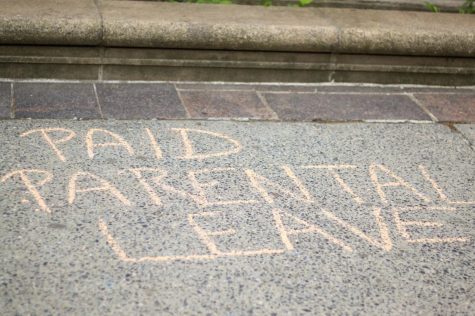
Email from NYU to parents’ mailing list causes controversy
Members of the union, as well as faculty and undergraduate students, criticized an April 26 email sent to parents by the university notifying them of the strike. Jake Colosa, a CAS junior and co-chair of the NYU chapter of the Young Democratic Socialists of America, accused the university of attempting to “paint GSOC in a negative light.”
“It carries the same condescending and egregious tone of the letter sent to students,” Colosa said. “In doing so, NYU gives our parents undue concerns about the strike and is a clear attempt to further divide NYU students and parents from the union.”
In the email, NYU president Andrew Hamilton called the strike “unwarranted, untimely, and regrettable.” He added that a mediator could have resolved negotiations between GSOC and NYU, as happened in 2015, and as happened recently at Columbia University and Harvard University.
“NYU has made a generous offer, remains committed to good-faith bargaining, continues to have the goal of achieving a fair contract, and will remain focused on our educational and scholarly missions,” the email reads.
On Twitter, some claimed the email was sent to the parents of striking graduate students, and some graduate students confirmed their parents had received the message. In response to the criticism, university spokesperson John Beckman released a statement saying the email was sent to the usual parent mailing list.
“The claim that NYU wrote to the parents of its striking graduate employees is a lie,” Beckman wrote. “No info on the parents of graduate or professional students is added to the list by NYU. Any parents of graduate students who happen to be on the list are there because they chose to opt on to the list, or perhaps have a child who was previously an undergraduate at NYU.”
Jacob Remes, a clinical associate professor at the Gallatin School of Individualized Study, said that union contracts should be negotiated at the bargaining table, rather than through an email to strikers’ parents.
“The university is better off negotiating and coming to terms with the union than it is trying and failing to win people over through mass emails,” Remes said. “It is a shame that in a semester that has already been so disruptive, uncertain and up in the air for all of us — and especially undergraduates — that the administration chose to stonewall and refuse to negotiate reasonably.”
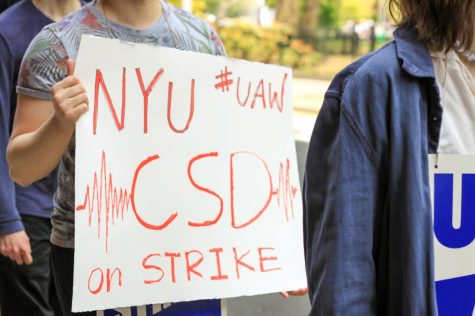
Faculty and students pledge solidarity
In solidarity with the union’s efforts, faculty members and student organizations have publicly expressed their support for the strike. Academic departments and faculty groups, including the NYU chapter of the American Association of University Professors, have written statements of solidarity. In a symbolic gesture, some faculty members have moved online classes from NYU Zoom to other platforms.
Remes attended the picket line on Tuesday, and was one of the faculty members who decided to stop using NYU Zoom in solidarity with GSOC.
“In an ordinary campus strike, we would be meeting in person and move our classes off campus,” Remes said. “It would be much more disruptive to the handling classes. I hope that the disruption that the strike has already caused is enough to remind the administration of the importance of negotiating fairly.”
At press time, a pledge created by the NYU YDSA has reached over 2,400 individual signatories, as well as endorsements from various campus organizations, including the Black Student Union and the Sophomore Class Activities Board.
Remes explained he has been picketing alongside the strikers with other professors because of his belief in the union’s demands.
“I go because graduate workers and I share a boss,” Remes said. “I, as both a fellow worker and a professor in the university, stand in solidarity with them. I want to help them be strong and get the message across and remind the administration that their work is what makes the university work.”
Email Rachel Cohen at [email protected] and Arnav Binaykia at [email protected].























































































































































